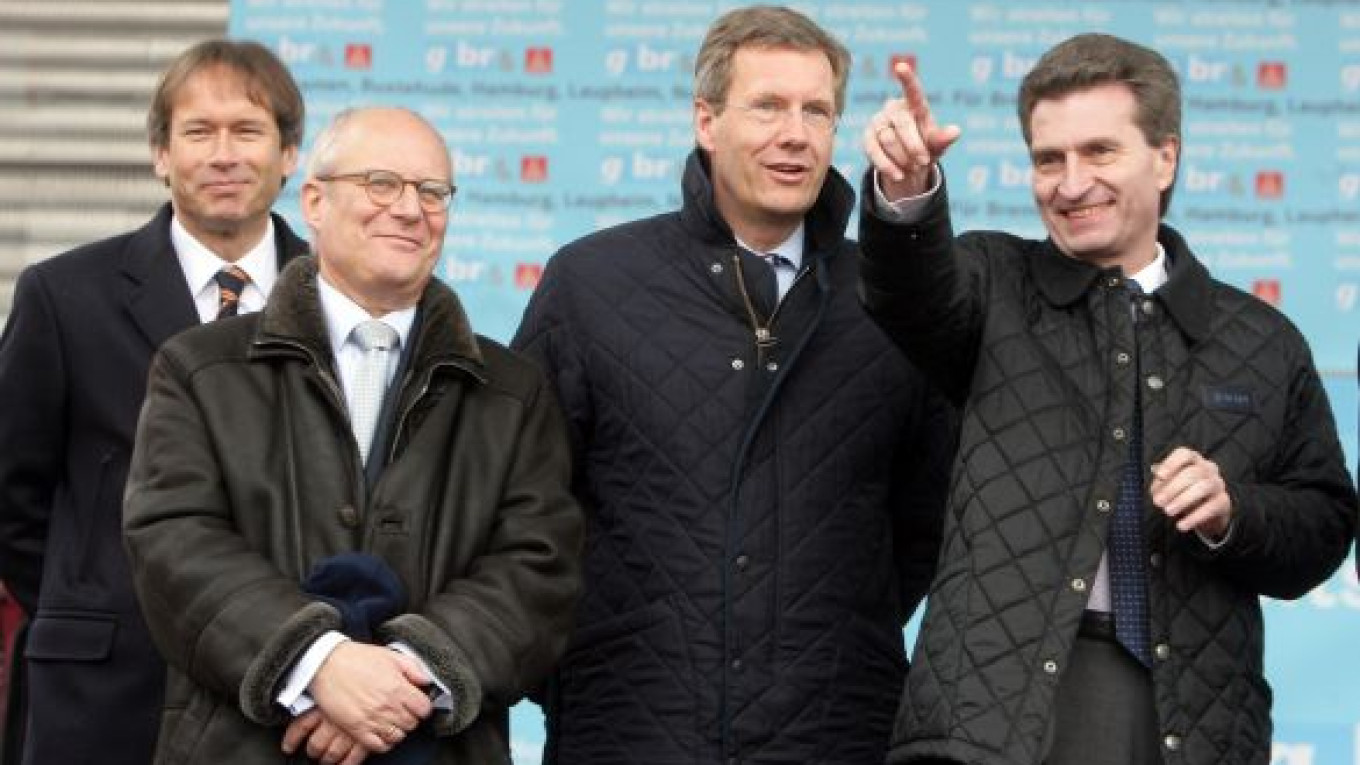Günther Oettinger was named European Union energy commissioner on Friday, a post responsible for guarding the bloc’s oil and gas supply security and promoting the use of cleaner technologies to protect the climate.
The decision was announced by the European Commission in Brussels. The appointment of Oettinger, who governs the German state of Baden-Württemberg, still needs approval from the European Parliament.
The new commissioner, nominated by German Chancellor Angela Merkel, will need to work closely with oil and gas producers while cutting the region’s reliance on dominant suppliers. The EU increased calls for energy diversification this year after Russian gas shipments were disrupted in January. The bloc gets a quarter of its gas from Russia, most of which flows via Ukraine.
“Energy security and good relations with suppliers will certainly be an important task for the new commissioner,” said Christian Schulke, a researcher at the French Institute for International Relations. “The liberalization of the market, boosting the share of renewables in the EU energy mix and decarbonizing the power sector will also all require a lot of effort.”
The EU has set a target to get 20 percent of its energy from renewable sources by 2020, more than double the current share. It also aims to increase energy efficiency and expand the use of climate-friendly technologies to reduce emissions blamed for global warming.
The 27-nation bloc is also seeking additional supply routes to reduce dependence on Gazprom and avoid a repeat of cutoffs that have curbed deliveries twice since 2006.
Relations between Gazprom and Ukraine remain tense as the country seeks International Monetary Fund assistance to pay for gas and Prime Minister Vladimir Putin warns of a further supply halt in the event of nonpayment.
Earlier this year, the EU agreed to help fund the 7.9 billion euro ($11.7 billion) Nabucco gas pipeline, which is due to send Caspian-region gas via Turkey to Austria starting in 2014. Nabucco, which would bypass Ukraine, is competing with the Gazprom-led Nord Stream pipeline project that would send Russian gas under the Baltic Sea to Germany.
Oettinger will need to ease tensions between energy-importing countries seeking to strengthen security of supply and producing nations that are concerned that demand will fall. Current Energy Commissioner Andris Piebalgs began regular talks with the Organization of Petroleum Exporting Countries in 2005.
Picking a politician from Germany, the EU’s biggest country with relatively strong gas and oil ties to Russia, as energy chief could be seen as either risky or clever, said Charles Grant, director of the Centre for European Reform in London. One potential advantage is that Oettinger could help make the case for a more coherent EU energy policy, Grant said.
Oettinger may face reluctance from national governments to cooperate at a regional level. Many view energy as a strategic area with limited scope for EU-wide policy. Even with new legislation to open power and gas markets to cross-border competition and cap air pollution from energy companies, he may struggle to convince member states to cede more authority to the EU and complete energy-market integration, Schulke said.
A Message from The Moscow Times:
Dear readers,
We are facing unprecedented challenges. Russia's Prosecutor General's Office has designated The Moscow Times as an "undesirable" organization, criminalizing our work and putting our staff at risk of prosecution. This follows our earlier unjust labeling as a "foreign agent."
These actions are direct attempts to silence independent journalism in Russia. The authorities claim our work "discredits the decisions of the Russian leadership." We see things differently: we strive to provide accurate, unbiased reporting on Russia.
We, the journalists of The Moscow Times, refuse to be silenced. But to continue our work, we need your help.
Your support, no matter how small, makes a world of difference. If you can, please support us monthly starting from just $2. It's quick to set up, and every contribution makes a significant impact.
By supporting The Moscow Times, you're defending open, independent journalism in the face of repression. Thank you for standing with us.
Remind me later.


